
(Click to zoom in and out.)
| "Guy Lombardo advertises the sweetest music this side of heaven and that's what he plays." | |
| - | Louis Armstrong |
Ha? (to quote Shakespeare). Louis Armstrong thought Guy Lombardo played "the sweetest music this side of heaven"?
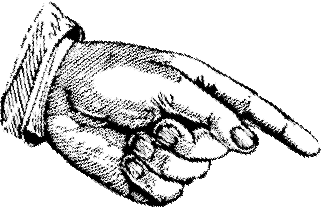 LOUIS
LOUIS
ARMSTRONG????
!!!!????!!!!
!!!!
Well, yes, Louis liked whatever music he liked. He didn't care what anyone called it or what the critics said about it. If he liked it, he liked it. And dang it!, he liked the music of Guy Lombardo and His Orchestra.
Some people wonder why Louis Armstrong - "Satchmo" - became so famous. After all, there were many innovative trumpet players in the early years of jazz that lived deeply into the 20th century. And yet when Louis died in 1971 just before his 70th birthday, the accolades poured in from around the world unlike those for any other figure in the history of jazz.
Well, as system analysis tells us, a single unique outcome can arise from multiple interacting factors.
One obvious reason for Louis's iconicity is he was one of early jazz innovators who also lived long enough to appear on television. So instead of being seen by a hundred people at a night club, Louis was seen by millions. King Oliver and Bix Beiderbecke are well known to jazz fans, but neither lived into the era of long distance electronic entertainment and so are not known to the general populace.
But Louis didn't just become famous because he appeared on the tube. He made real contributions to jazz as one who, we might add, was there pretty much at the beginning. The way he played spread the music's poplarity.
Perhaps Louis's biggest contribution to the music is that he was one of the first - some say the first - player to break from "ensemble" playing and began featuring the soloists. The old style Dixieland music - that is, New Orleans jazz - was originally derived from marching music. So pretty much everyone played together. A good example of this style is "Just Gone" as played by King Oliver and his band.
Of course, the transition of one musical form to another is never abrupt and even in early New Orleans groups, you'll hear the rest of the band step back and let one of the players stand out. King Oliver played such songs like "Canal Street Blues" where the clarinetist takes a solo, and on "I'm Going Away to Wear" where Lil Hardin - later Louis's second wife - hits it on the piano. But these solos tended to be brief and most of the time everyone was playing together.
But because of Louis's strong tone, even in the tutti passages, his line dominates the playing. And yet Louis didn't monopolize the tunes. After the band played an introduction, another player - maybe Jimmy Dodds, on clarinet, Kid Ory on trombone, or Lil on piano - would step out while the others toned down their dynamics. Then another player would solo until everyone in the band had strutted their stuff.
The irony is hard to miss. The man who many see as the leading icon of New Orleans jazz was one of the major innovators for the "Chicago Style". And the style did come from Chicago. King Oliver had relocated to the Windy City in the early 1920's and he later invited Louis to join him. Then when Louis formed his own band, the famous "Hot Five", and began to feature his other players, the music was rebranded. And if you hear a Dixieland band today, it's a good bet they're really playing Chicago Style.
But Louis was from New Orleans. According to the most reliable sources, he was born in 1901 although one researcher believes it could have been as early as 1898. Louis himself said it was 1900.
Willie Armstrong, Louis's dad, left his him and his mom, Mary Ann Albert (called Mayann) not long after Louis was born. We don't know what the problem was between Willie and Mayann. The difficulties may not have been entirely one side. Willie seems to have been a hard worker and he ended up with a reasonably good job as a foreman in local factory. He also participated in the parades that were (and are) part of New Orleans' festival culture. Louis would see him from time to time marching by.
But whatever the circumstances, Mayann was left by herself with virtually no way to make a living other than taking menial jobs that would barely support her, much less provide for Louis and his little sister. So she sent little Louis to live with her own mother. Not that Grandmother Albert made much money either. When Louis was seven he moved back with his mom.
Louis's first home wasn't in the New Orleans Storyville district, famed for its honky-tonks1 and sporting houses (and we don't mean shops where you can buy baseball gloves, running shoes, or golf clubs). Instead Louis lived in what was called the Battlefield. The name pretty much says it all. It was a rough neighborhood, and if someone learned you were from the Battlefield, they didn't give you any trouble.
Footnote
Today a honky-tonk refers to a bar - often one of a lower social standing - that features live country and western music. But Louis referred to the bars around New Orleans as "tonks". So a more encompassing definition will include taverns featuring popular music of any type.
Louis's formal education ended after a few years and he quit school to find work. Of course, the only work he could do were various and not numerous odd jobs. The best thing would be to find a business that needed regular work that a kid could provide and cheaply. Louis was fortunate in that respect when he met the Karnofsky family.
The Karnofskys lived in the Jewish neighborhood which wasn't too far away from Louis's home. Louis saw how they went around with a horse and cart collecting discarded items from the residents for resale. Louis asked if he could help them.
Certainly, they said, and so Louis would scavage the neighborhoods for domestica disjecta and he'd turn them over to the Karnofskys and get some pennies in return. But he also went with them on the rounds as they picked up old bottles, tin cans, and rags and bones to sell to businesses that needed glass, metal, rags, and bones (bones were used to make buttons and fountain pens). In America such workers were called "junk men", but in England it was the more polite "rag and bone men".
The Jewish residents were poor but Louis saw that they worked together and were able to form stable families and home lives. He also saw how kind they could be. After a day's work Louis would get his pay and then Mrs. Karnofsky would insist he stay with them for dinner. She wouldn't let him leave until he had eaten a good meal. For the rest of his life Louis wore a Star of David.
New Orleans was a musical city. Music was everywhere: at parties, during holidays, carnivals, and even at funerals. And in the pre-electric days, if you wanted music, it had to be live music; either someone making it for you or you making it yourself. Social or professional clubs often had their own bands that would parade through the streets whenever the occasion demanded.
And besides, you might even make some money at it. Louis and three of his friends formed an amateur quartet where they'd pick out a street corner and sing for tips. About this time his friends began calling him "Dippermouth" because of his wide and infectious grin, a name that was later discarded for "Satchel Mouth".
But what Little Louis particularly loved were the brass bands that paraded through the streets. He saw the musicians decked out in clean and fancy uniforms and how they were admired and cheered by the crowds. He was determined to be one of them and he particularly noted the trumpet players and cornetists who usually carried the melody and got most of the applause.
Singing on street corners didn't bring in much ready cash. So Louis kept looking for ways to supplement his income. In addition to working at odd jobs, he discovered what the polite call "gaming". In particular back alley dice games were always a way to pick up or lose some spare cash. Also - yes, this is true - Louis and his buddies found they could slip into stores and pilfer a bit of food for consumption or merchandise for sale. So Louis's formative years were not always with the best of supervision.
Then on New Year's Eve 1912, Louis and his quartet went out for some celebratory harmonizing. For some reason, Louis pocketed a pistol that one of his mom's boyfriends left lying around the house. We also read it was mostly for show as it was loaded with blanks.
What happened next isn't clear. In one telling he and his friends went along to find a suitable performing corner and another kid came up. For whatever reason, the newcomer drew a gun - also supposedly loaded with blanks - and fired. In response, Louis pulled his pistol and (blank) gunfire erupted in the streets. Another story is that Louis just fired the gun in the air out of sheer exuberance.
Whatever really happened, Louis was immediately snagged by Long John Goreman, one of the no-nonsense local constables. Long John didn't bother wasting his time listening to any hurried explanations, and he hauled the protesting youngster to the hoosegow.
It wasn't until January 2 that Louis got his due process. Louis, the judge learned, was a street kid. If he released Louis with a warning - which was an option - he'd just get into trouble again, maybe with more dire consequences. So to "straighten him out" - to use a term popular among the follicularly challenged in the more provincial regions of the United States - he remanded Louis to the Colored Waifs Home - that really was the official name - and for an indefinite term.
Although at first Louis was frightened and disoriented, in a short while he realized that the Waifs Home really wasn't that bad. In fact, it was better than being at home. The food may have been the same - a lot of beans and rice - but there was enough of it, and it was served regularly.
But best of all they had a band. Louis would sit by and listen to them practice. The accepted rule, though, was you couldn't ask to join. Membership was by invitation of the director, Peter Davis.
It took some time but Peter eventually asked Louis if he wanted to be in the band. Naturally he said yes and was a bit disappointed to be given a tambourine. But Louis quickly advanced to bass drum and then to an alto horn - an instrument similar to the euphonium or baritone horn where the fingerings are identical to that of the trumpet. He was also selected to play reveille on the bugle to wake the kids up. He did well enough that the soon he was given a cornet.
Director Davis himself was largely self-taught and didn't always understand all the details of playing some of the instruments. He didn't notice that Louis was placing the mouthpiece against the inner and softer part of his lips rather than the firmer upper and external areas. Louis also pressed too hard against the mouthpiece particularly when reaching for high notes. This was a habit Louis never broke, and it produced calluses and sores on his lips which later gave him considerable trouble.
So all in all Louis found life in the Waifs Home was pretty good. He could play music, had regular meals, and he got along with the other kids. They saw him as something of a jokester who could make everyone laugh.
Louis, though, was getting older. He had been in the Waifs Home almost 18 months and whether he was almost fourteen or sixteen is really irrelevant. Despite the relatively easy life in the Home, he was wanting to get out and be on his own.
Then to his surprise, Louis was released to his father's custody. It seems Willie had remarried and was working as a foreman of a turpentine plant. Unfortunately Willie wasn't completely prompted by paternal responsibilities - at least not for Louis. Since his wife also worked, Willie decided Louis could be a baby sitter for their two kids. As many find at one time or another, taking care of toddlers is not an easy task.
This situation continued until Willie's wife had another kid. Then she decided to quit her job and stay at home. Louis was now just another mouth to feed and Willie sent Louis back to live with Mayann. But that was fine; Louis had never really liked being a baby-sitter anyway.
For the next few years Louis continued to work at odd jobs. Finally he found regular work delivering coal. The hours were long and the work hard and dusty and there wasn't much time to learn music.
Then Louis stuck up a friendship with an older man, Bennie Williams. Bennie was one of the sporting characters from around town and had a reputation as a tough hombre. He made money any way he could. One of his favorite jobs was to go up to someone and asked them if they were carrying a gun. If they were, Bennie would relieve them of their burden and go sell it. But no one dared argue with Bennie.
But Bennie was also a drummer, and Louis told him he also wanted to be a musician. So Bennie, who kind of liked the kid, started "suggesting" (note the quotes) to the Storyville band leaders to let Louis sit in. Louis had to borrow his horns, and he really wasn't that good. But as we said, no one ever argued with Bennie.
Well, as the Captain of the Pinafore said, hardly ever. Bennie had lots of lady friends and at some point one of them found a case for disputation. Words weren't persuasive so she yanked out a gun and blasted away. Bennie was hit in the heart. Although he lived another week, he ultimately lost the argument.
Fortunately by that time Louis was good enough to sit in with the bands. In fact, he was gaining a reputation of being a good player of the blues and ragtime. At least that's what the people called it. But what Louis was playing was jazz.
The origins of the name remains obscure. One story is that a blind newsboy in New Orleans named "Stale Bread" made the word up for the type of music he and his band played. However, that's unlikely since the word had other meanings which were in fact related to its Storyville origins. Well into the 1930's the word "jazz" also meant to ...
Well, never mind. Check out the early 20th century novel Studs Lonigan and you'll get the idea.
Nevertheless, it's still an interesting exercise to look for the word "jazz" in old newspapers. You'll struggle to find the word before 1916 either as "jazz" or the alternative spelling "jass". The latter rendering, though, wasn't really that common and the double-Z spelling predominated early on. The rapid rise in documented usage at this time was helped with the release in 1917 of a number of recordings by the somewhat misnamed "Original Dixieland Jazz Band".
Scholarly consensus is the music was indeed a fusion of blues and ragtime that had been adapted to the New Orleans brass bands. The brass bands with their rugged outdoor instruments had been around since the Civil War, and by the end of the 19th century, other instruments like clarinet and the four string tenor banjo began to creep in.
Louis knew that to become a good player he had to have his own instrument. So when he was 17 he borrowed 10 dollars and bought an old battered cornet from a pawn shop. Now he had the wherewithal to serve as a substitute horn man if the usual player didn't show up.
Finally a Sicilian saloon owner named Henry Matranga asked Louis to be part of his house band. At Matranga's the players earned a dollar a night plus tips. But Louis could still play with other bands if the opportunity arose.
As he got better Louis found he could substitute for better musicians in better bands. And for cornetists, the better of the best was Joe Oliver, who we met earlier as "King" Oliver. Louis met King by going to the parades where King was playing and offering to carry his case. Louis also met Stella, King's wife, and made a good impression. King, by the way, was noted for being a family man and on his nights off rather than hang around the saloons and other establishments, he'd stay home with Stella and his stepdaughter. Also King didn't drink much. But he did like to eat and this showed. The alcohol abstemiousness and the gustatory indulgence was a lifestyle that Louis would also embrace.
Naturally the best cornet player in New Orleans played in the best band. That was led by trombonist Ed Ory. Called "Kid" - although he wasn't - Ed didn't play in "tonks" or saloons. His group catered to higher class hotels where they'd play for dances and dinners. As a result if you played in Kid Orys' band you were paid better. But Ed demanded both excellence in musicianship and - equally important - reliability.
Louis, though, found that being a substitute cornetist didn't have much room for advancement and anyway it was a buyers' market for musicians for hotels and saloons. But one reasonably open venue was playing on the riverboats which still paddled their way up and down the Mississippi. It also got him away from the poorer sections of town and let him get a glimpse of the wide world outside.
Getting a job on the riverboats was one opportunity for the up-and-coming New Orleans musicians. In fact, it was becoming essential. After all, in 1918 Storyville - along with its musical establishments - suddenly vanished.
When America joined World War I, New Orleans became a port of embarkment and disembarkment for the troop ships. The top brass, many of whom supported traditional family values, were aghast to see the troop trains pull up to the stations where from the balconies and windows the young ladies would display their charms - and we mean their charms. Finally with some reluctance but with the pressure from the Federal Government, Mayor Martin Behrman shut down the entire Storyville district in a single night. Naturally the businesses had to close or go elsewhere and operate incognito.
A lot of musicians were suddenly cut adrift. Some hung up their instruments; others stuck around. But there were only so many riverboats. So a lot of jazz musicians headed north, and in 1918 King Oliver and Stella settled in Chicago.
Louis, though, kept playing on the riverboats and in the remaining tonks. He now had a reputation as a hot horn man who could really blow. But his reputation was limited to the New Orleans and environs.
But King Oliver remembered Louis. After he arrived in Chicago, King had played with Bill Johnson and with Lawrence Duhe in the higher class clubs. He later rejoined Kid Ory in California, but by 1922 he was back in Chicago. And he was leading his own band, King Oliver's Creole Jazz Band.
It may be that even at this late date King was beginning to suffer from the problems with his teeth and gums that ultimately led to his abandoning performing. But in any case, he decided a second cornet player was needed. So he sent a telegram to Louis asking him if he wanted to join his band.
Louis didn't have to be asked twice. He hopped the train and was soon playing with King in the clubs and hotels. In 1923, he made his first recordings.
They say it's a poor student who doesn't outstrip his teacher, and Louis quickly became the best trumpet man around. Yes, trumpet. After a while Louis switched from cornet. The trumpet has a bit of a brighter sound and besides, with it's longer, leaner design, it looked more impressive.
By 1925 Louis was leading his own band called the Hot Five. The band, we should point out, was garnered together specifically to cut records. It featured Kid Ory (trombone), Johnny Dodds (clarinet), Johnny St. Cyr (banjo), and Lil Armstrong, née Hardin, on piano. If it looks like Louis was snitching from King Oliver's band, that's exactly correct.
But such turnover and swapping of players represented nothing nefarious and was a quite common and accepted practice. Sometimes the same individuals would even play under different names. And like most groups, Louis's Hot Five changed personnel as time went on. With a couple of later supplements, it became The Hot Seven.
Louis's first records were produced by Okeh, which was originally a "folk" label that lasted through the 1960's. The name has been revived at different times and you'll find new records released under the name. Recording for Okeh was a big step for musicians, and Louis and His Hot Five/Seven became stars.
Yes, but why did Louis become not just a star but an icon? By the 1950's he was appearing everywhere - live to packed theaters, on radio, and on that new fangled invention the television. And most people who saw him never heard of Joe Oliver.
The question is identical to why did people liked his music. One reason is that his records were of high quality. Louis's first recordings were made in 1925 which coincided with the introduction of electric recording, an advancement that instantaneously shoved aside the old acoustical technology. No longer did the music sound like it was being recorded from the bottom of a 55 gallon barrel. Suddenly good music didn't have to be live music.
There was also the music and Louis's new arrangements. One problem with the old fashioned ensemble playing was hard to pick out the tune. It was, as one resident of a Quaint Town of the Southwest once said, like hearing five people playing five different songs at the same time.
Not so with Louis. His music was easy to listen to and the melody easy to hear. This wasn't just because Louis's volume let his trumpet rise above the other players. The arrangements were also relatively simple which avoided hiding the melody behind the accompanists. By breaking up the songs into solos and tutti passages, Louis avoided the monotony that came with bands that stuck with ensemble playing.
Ironically for someone considered one of the best trumpet players, Louis didn't try to impress the listener with flashy technique consisting of never ending thirty-second-note runs and screaming high notes although he sometimes did play thirty-second note runs and screaming high notes (high G - concert F - was well within his range). Usually the tempos were moderate since back then people actually danced to jazz.
Finally the early recordings give us the first examples of Louis's singing. His voice was unique. Yes, it was gravelly but he sang perfectly in tune and gravelly or not, his voice was quite pleasant to listen to and his lyrics easy to understand . His recording of "Heebie Jeebies" was also the first widely distributed release of "scat" singing - that is, making up nonsense syllables, a genre of which Blanche Calloway's brother, Cab, became a master.
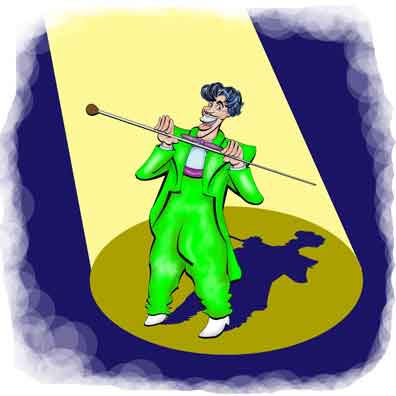
Cab Calloway
A Master
Louis also played with a unique style that few have copied. He would bend the notes (a la the Blues) - a fairly common technique - but he also made liberal use of harmonic series shakes (i. e. lip trills) more so than many other trumpet players.
Over the years Louis didn't just stay with his own band. He would played with other megastars: Ella Fitzgerald, Fats Waller, Bessie Smith, Alberta Hunter, Gordon Jenkins, Bing Crosby, Danny Kaye, Sidney Bechet, Jack Teagarden, Fletcher Henderson, Earl Hines, Blanche Calloway,. He even performed with some guy named Lenny and His Band - it was called something like the New York Philharmonic.
But best of all, Louis's playing, his showmanship, and his personality was perfect for the #1 pastime in the history of the universe - watching television.
From 1949 until 1971, Louis appeared on television over 130 times. A small selection of the programs that featured Louis (with or without his band) were The David Frost Show, The Tonight Show Starring Johnny Carson, The Dick Cavett Show, The Merv Griffin Show,The Joey Bishop Show,The Bell Telephone Hour, The Hollywood Palace, The Jackie Gleason Show, The Kraft Music Hall, The Danny Kaye Show, The Dean Martin Show, The Ed Sullivan Show, and I've Got a Secret. If there's any doubt about his appeal to the populace, Louis was a guest on the rock and roll show Shindig! as well as the Johnny Cash Show. When he played with Johnny, Louis recreated the time in 1930 when he recorded Blue Yodel #9 with Jimmie Rodgers. Yes, Louis played with Jimmy Rodgers.
They played with Louis:
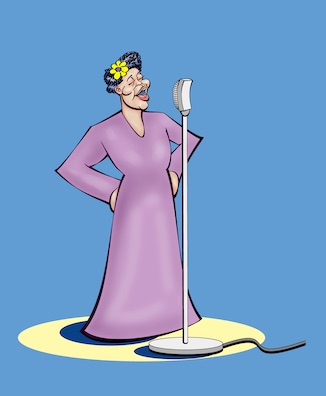
Ella Fitzgerald ...
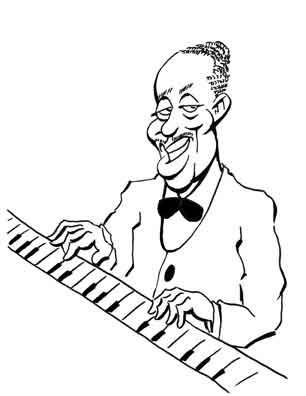
... Duke Ellington ...
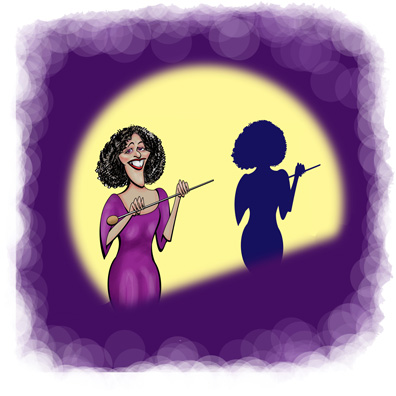
... Blanche Calloway ...
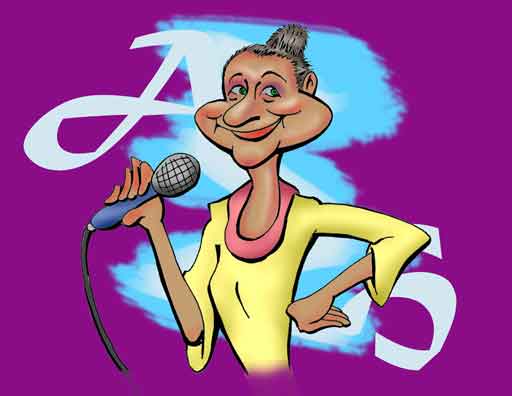
... Alberta Hunter ...
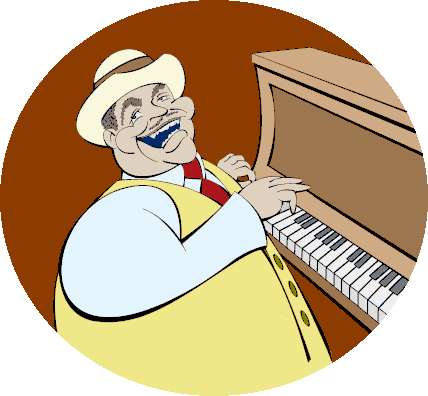
... Fats Waller ...
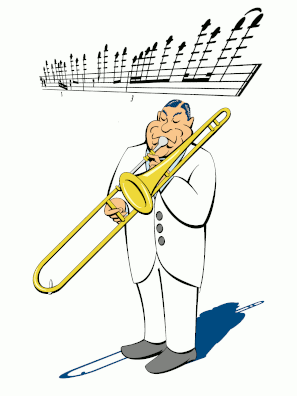
... Jack Teagarden ...

... Bessie Smith ...
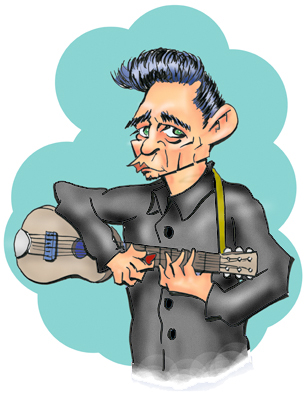
... Johnny Cash ...
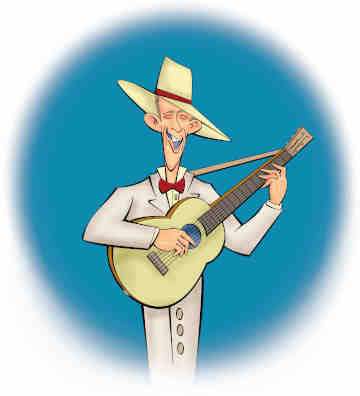
... Jimmie Rogers ...
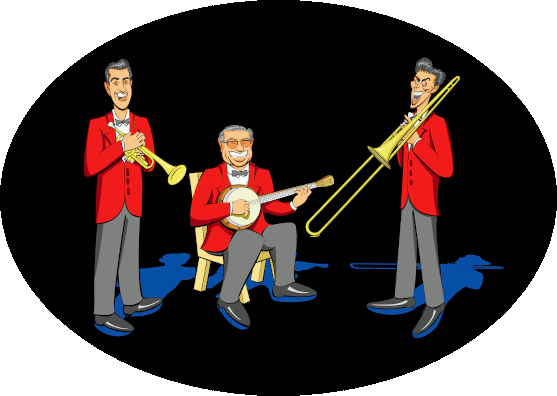
... The Dukes of Dixieland ...
... and some guy named Lenny.
Well, OK. All this is well and good. Louis created a music that was popular, accessible to everyone, he appeared before millions of people throughout the world, performed with the best singers and musicians, and directly influenced almost every other form of popular music for the rest of the century.
Let's have another reason.
Well, that's easy. Louis also became popular because - like Elvis - he had an astute manager. For Elvis is was Colonel Tom Parker. For Louis it was Joe Glaser.
Big Joe was the son of a Jewish physician and his wife. But early on Joe, though, decided to be a sports promoter. Since at that time there were only three sports of any note - baseball, horse racing, and boxing - Joe opted for the latter. He also began investing in night clubs.
Unfortunately, running nightclubs in the early 20th century and - ah - "promoting" boxing matches also meant you had to deal with that pesky class of American citizens known as the mob. And if your main place of business was the South Side of Chicago, you had of deal with one particular mobster, Alphonse Gabriel Capone. We won't go into details but by the time he became Louis's manager Joe's past and reputation was, well, a bit dodgy.
In 1935 Joe's dealings with his past associates had made it increasingly hard for him to find work. Louis had also been having difficulties dealing with the people who ran the entertainment businesses in Chicago. Knowing that Joe was a no-nonsense type of guy and had Chicago connections, he went to Joe and asked about him being his manager. Up until 1969 - when Joe died - the two men worked in what was obviously a lucrative partnership.
Just how much of a real partnership it was has become the object of some debate. One story is that Joe took Louis to the cleaners, kept most of the money for himself, and after he died, left Louis with nothing. So at the end of his life, Louis was broke.
Others say this is nonsense. Not that Joe didn't take more than an agent usually is considered entitled to (typically 10%). But Joe also did much more than just make the bookings for Louis. He was Louis's accountant, business manager, financial planner, and at times just his all around factotum. In short, whatever Louis didn't want to do, Joe did. This left Louis without the need to hassle with the business end of being a performer and left him to focus on the music. If he or Lucille needed some cash Joe would hand it over. Louis also kept track of his expenses and he would write to Joe asking him to take care of specific - and by no means inconsiderable - invoices. As far as we can tell, Joe always did.
One example of Joe's fairness to Louis is related to Louis's songs and records. For tax purposes it was sometimes best for composers or recording artists to set up a business entity that owned the rights to their songs. The artists would then be paid by the business. Joe and Louis set up such a partnership, and Joe would have been entitled to bequeath his part of the company to his other business associates or his family.
Instead Joe's will returned all of the rights back to Louis. This may seem to be the only fair thing to do - which means that Joe saw that he had an obligation to be fair to Louis. As for Louis dying broke, that would have been hard to do if he had the rights to all his songs.
But the best thing Joe did for Louis was to pay his taxes, promptly and honestly. Unlike some entertainers - the names are easy to come by - Louis never had tax problems. He knew that Joe would render to Uncle Sam what was Uncle Sam's. One thing to note is that throughout his life - even after Joe was dead - Louis had nothing but good to say about Joe Glaser.
References and Further Reading
Louis Armstrong: An American Genius, James Lincoln Collier, Oxford University Press, 1983.
Louis Armstrong: An Extravagant Life, Laurence Bergreen, Broadway Books, 1997.
What a Wonderful World: The Magic of Louis Armstrong's Later Years, Ricky Riccardi, Pantheon Books, 2011.
Louis Armstrong, In His Own Words, Lewis Armstrong, Thomas Brothers (Editor), Oxford University Press, 1999.
"Louis Armstrong", Encyclopedia Britannica.
"Happy Birthday, Louis Armstrong!", Mindy JarrettNew Orleans Jazz Museum, August 4, 2019.
"Louis Armstrong, Joe Glaser and 'Satchmo at the Waldorf', The Wonderful World of Louis Armstrong, Ricky Riccardi, June 6, 2015.
"Louis Armstrong: The First Great Jazz Soloist", Steven Lewis, Smithsonian, September 2016.
"The People of Traditional New Orleans Jazz: Louis 'Satchmo' Armstrong, 1901-1971", New Orleans Jazz National Historical Park.
"What Is The Difference Between New Orleans and Chicago Dixieland Jazz?", Bruce Chidester, The Trumpet Blog, February 6, 2015.
"Music: Louis the First", Time, February 21, 1949.
"Louis' Music Class", American History, Smithsonian Institution
1921 Catalog of Victor Records, Victor Talking Machine Records, USA, 1920.
"'Stale Bread's' Sadness Gave Jazz to the World", The Literary Digest, Volume 67, 1919.
"Saloonkeepers Plan to Organize for Fight on Prohibition Crusade", The Day Book, December 13, 1916.
"Louis Armstrong", Discogs.
"Louis Armstrong", Discography of American Historical Recordings, University of California - Santa Barbara.
Studs Lonigan, James T. Farrell, Vanguard, 1935.
Records and Charts.
"Louis Armstrong", Find-a-Grave, December 31, 2000.